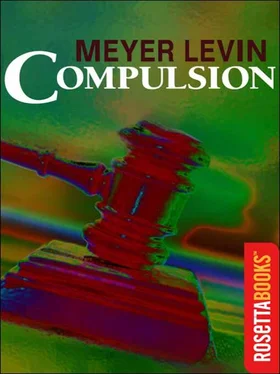Too keyed up to sit at the dinner table, I decided to go over to Ruth’s. Artie followed me to the door, telling me to be sure to meet him tomorrow. “I’ll give you the benefit of my expert knowledge,” he half jested. And in the same breath he snagged Milt Lewis, who was passing. “Hey, Milt, you want a sure lay? I’ve got a terrific number.”
Ruth was my girl at that time. Or rather, I should say Ruth was my sweetheart, for there is no period that encompasses my feeling; whenever I think of her, and now as I write of her, the aura of that young love comes back, and I realize that what we then felt was indeed love. We were in love and afraid to know it, and nobody told us it was the true thing.
She was eighteen, a few months younger than I, and a sophomore. We had met on campus, and dated, and petted; in the long moony evenings we spent together we would stroke and excite each other and decide that this alone couldn’t be love. She was bright, all A’s, and we would discuss the new poetry of Amy Lowell, and we discovered Walt Whitman together, and read his poems of the body aloud to each other sometimes as we lay close side by side on the grass in Jackson Park. We read them wholesomely, without any suspicion in those days that he could be singing of another kind of love. And innocently reading Whitman, we used to discuss whether Ruth should give herself to me – that was how we put it – or whether we should wait.
Ruth’s folks were better off than my family, but still something of the same kind. Her mother, like mine, was always plying you with food, putting a plate in front of you even if you said you had just eaten.
Pushing the bell, I took the stairs two at a time; Ruth appeared in the doorway. “You’re a nice one!” she said reproachfully. And only then I remembered we had had a date for the afternoon.
“My God, look at you. Did you even shave today?” her mother demanded, from behind Ruth. “I’ll bet you haven’t eaten all day either.”
“I haven’t stopped going since morning!” I said, bursting to tell my big news, but Mrs. Goldenberg disappeared into the kitchen, immediately fetching a bowl of noodle soup, calling, “Well, you’re lucky Ruth isn’t gone.”
“Yes,” said Ruth archly. “You might have found me missing.”
“Who with?”
“Oh, a swell machine, a Franklin, stopped at the door,” said her mother.
“He honked enough for the whole street to hear,” said Ruth.
“Millionaire’s manners.” Mrs. Goldenberg went back for meat and potatoes.
“In fact, it was a frat brother of yours,” Ruth teased. “The sheikh of the campus, no less, suddenly remembered I was alive.”
“Artie? I just saw him at the house,” I said. “I didn’t know you go out with him.”
Oh, Ruth told me, not really. So it was odd, the way he had appeared all of a sudden today, saying he was lonesome. He had seemed quite upset.
“It must have been the murder, so close to his house,” I said, and pulled the paper from my pocket, spreading it on the table.
“Oh, I know,” Ruth said. “I read the extra. Isn’t it terrible!”
It really was, I agreed – after all, I had really seen it. “You mean this was you? The reporter that identified the body! Oh, Sid!” Ruth’s voice hovered between pride and shock.
“Horrible, a horrible crime!” her mother said, and urged me to eat. Chicago was becoming so terrible, you couldn’t even let a child go out in the street. And it was I who had reported all this, on the frong page?
“You saw the body? Poor kid.” Ruth was gazing at me, as though she could virtually see the child, through me.
I told her how the teacher had been arrested, and how Artie’s little brother was in the same class.
“I know. Artie told me. That’s why he was so upset. He tries to act blasé, but I think Artie is really softhearted,” Ruth said.
“Oh, yeah,” I said. “You’d better watch your step with him. That’s how he gets all the girls, with that winsome boyish line.”
“Do you think he’ll seduce me?”
“No, but he’ll say he did.”
Her mother disappeared. Mrs. Goldenberg always said she was broadminded and if her girl was going to do anything like petting, it was better for her to do it in her own home. So we sat on the overstuffed sofa in the sun parlour, and I kissed Ruth and put my hand over her breast. That was our limit.
“It’s so horrible about that little boy,” she said.
I remarked that it seemed pretty certain the crime had been done by a pervert.
We were silent for a moment, and then she said in a classroom-questioning voice, “What exactly is a pervert, Sid? I guess I’m supposed to know, but I don’t.”
I explained, trying not to reveal that my own knowledge was limited.
“But then,” Ruth said, “aren’t they suffering from a sickness?”
It was the first time in the whole day that I had remained still long enough for this thought to come through. And while I might ordinarily have expected myself to concur in this broader view, I found now that the thought made me almost angry.
“We can’t forgive crime by calling it a sickness,” I snapped. “It was murder, after all. It was a cold-blooded attempt to collect money from a kidnapping. And the perversion was just an added act of viciousness; maybe it was even a cunning way to disguise the rest of the crime.”
Ruth had drawn her hand out of mine. I went on, “It’s simply like a savage – murdering, and then mutilating his victim out of sheer savagery.”
“But, Sid,” she said, “why are you so angry? I was only asking, not arguing.”
She looked at me so earnestly, her eyes puzzled, and I melted with love of her, and took hold of her and kissed her. In the kiss, our loving was seasoned with bitterness over the world I had seen that day. We sometimes said we had Weltschmerz , but it was more like a presentiment that everything would be vile in our time. On that day it was as though the crime had split open a small crack in the surface of the world, and we could see through into the evil that was yet to emerge.
From the other room, Ruth’s mother spoke. “Children, why don’t you dance? Put on the Victrola.” Mrs. Goldenberg snapped on the light behind us. “You know, Ruthie,” she said, “I’m thinking of bobbing my hair.”
Even though there were only the three of them at the table, Judd’s father, neatly carving the roast, gave the meal almost a formal air. This was the way of the Pater. In everything always so certain of how he measured things out. So he must have been in the early days, with Grandfather in the woollen business – measuring with his yardstick, the solemn, upright young Judah Steiner. And so with his honest yardstick he had measured the growth of the woollen house as it was drawn along with the growth of Chicago ’s garment industry, and with his yardstick he had measured what family to marry into, and purchased woollen mills, and measured his real estate, and his honourable place in the world.
Yet tonight Judah Steiner was trying to speak in a lighter mood to his sons. There was Max’s engagement party; next week his fiancée would arrive from New York. Aunt Bertha must see to it, the house should be filled with flowers.
Max was sitting there quite proud of himself for the fine piece of merchandise that had been selected for him by brother Joseph in New York, a Mannheimer, no less.
Could it be, actually, that neither of them had heard of the sensational crime? Judd considered bringing it up – the topic would be normal enough: the kid had been snatched from Twain, almost across the street. But now the old man was turning to him. Was Judd ready for his exam tomorrow? “A Harvard law entrance should be taken seriously, even by a genius.” He chuckled, wiping his moustache.
Читать дальше












